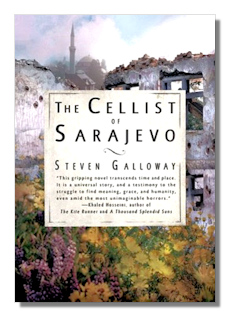
The Internet's Premier Classical Music Source
Related Links
-
Introduction
Acoustics
Ballet
Biographies
Chamber Music
Composers & Composition
Conducting
Criticism & Commentary
Discographies & CD Guides
Fiction
History
Humor
Illustrations & Photos
Instrumental
Lieder
Music Appreciation
Music Education
Music Industry
Music and the Mind
Opera
Orchestration
Reference Works
Scores
Thematic Indices
Theory & Analysis
Vocal Technique
Search Amazon
Recommended Links
Site News
 Book Review
Book Review
The Cellist of Sarajevo

Steven Galloway
New York: Riverhead Books, 2008. 235 pages.
ISBN-10: 1594483655
ISBN-13: 978-1594483653
Music is something as close to absolute value as one might get amid the horror of the prolonged siege of Sarajevo. The cellist who chose the exact site of murderous explosions to commemorate twenty-two deaths, by playing Albinoni's Adagio for twenty-two days, valued music more than his own life. His enormously courageous action represented an affirmation of the value of civilized activity in the face of an enormous assault on civilization itself.
This short novel was inspired by that historical fact. The rest is fiction, but supported by so many hours of interviews with survivors of the siege that the reader marvels at the ability of the author to place himself in the minds of his characters in this situation. No mention is made of the ethnicities of the participants in these events, though those who rained destruction from the hills, sniping at civilians at random, and burning a million volume library, are flatly identified as evil.
There are three main characters in the narrative, not counting the cellist who, after the opening chapter is simply there. Their actions are given discrete chapters and do not directly interact. The cellist is heroic. So is a young woman who calls herself Arrow, because she has taken on an identity and a role she does not want associated, even in her own mind, with the things she has to do. She has been a university student and has been persuaded to become a sniper – and protector of the cellist – because of the expert marksmanship she had learned as sport. There are limits to what she is willing to do. She, and the military officer she works with, strive to uphold the norms of civilized behavior while engaged in armed defense.
The lives of the other two main characters have been reduced to fetching water and providing bread, respectively. This is at great personal risk, but neither would consider himself courageous, though each endures great danger and witnesses great horrors. It is not easy to read about what they go through and, in fact, this novel might well have been written as a novella involving just Arrow and the cellist. But as it stands, this slight book can arguably be considered great.
Copyright © 2009 by R. James Tobin.


















